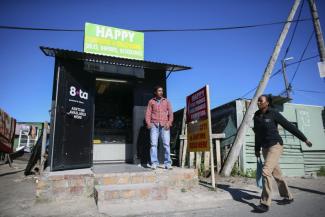Development policy
Managing migration in Africa

Florent Kossivi Tiassou, a journalist from Germany’s international broadcaster Deutsche Welle, recently visited a refugee camp on the Burundian-Tanzanian border. “Many people there asked me: How can we get to Europe?,” he recounts. But not all Africans on the run are heading for Europe. “Many people want to stay in Africa,” Tiassou says. For Burundians stranded in Tanzania, moreover, going to Europe will always remain a dream. They are poor, and Burundi is situated in the heart of the African continent.
Some migrants cannot go to Europe, and others do not want to. Accordingly, the majority remains in Africa. There are millions of internally displaced persons in their own countries and millions more in immediate neighbour states.
Administration of refugees and their inclusion in society often work much better in Africa than perceived from far away, says Hamidou Bouba, vice-president of the Central Council of the African Community in Germany, an umbrella organisation for the African diaspora. “If a society is ready to include people, it will happen – even when the political and administrative system is overwhelmed.”
Target countries often benefit from migration economically. Countries of origin, on the other hand, lose their young people and part of their workforce. Such brain drain is a big loss.
Although there have always been flight and migration, both phenomena have been attracting more attention in Europe since more than 1 million people came to the continent in 2015. In Germany, politicians and media increasingly discuss combating the causes of flight as a task of development assistance.
Benjamin Schraven of the German Development Institute (GDI) does not agree. In his view, it is more important to manage migration in a development-conducive way than to prevent it. Free movement of people – as the Economic Community of West African States (ECOWAS) foresees, for instance, – should be fostered, he said at an event organised by GDI, the European Association of Development Research and Training Institutes (EADI) and VENRO, the umbrella organisation of development and humanitarian aid NGOs in Germany, in Bonn in May.
Elke Löbel, who is in charge of the refugee issue at the German Ministry for Economic Cooperation and Development (BMZ), points out that development assistance already has an impact on migration in Africa. One example is Morocco, one of the few countries in Africa that has an asylum law as well as a programme for returnees. The BMZ advises Rabat on migration policy.
Tiassou, the DW journalist, takes a critical stance on the cooperation with Morocco, because that country treats black Africans extremely bad and denies them all rights. “The EU tries to use Morocco as a buffer for asylum seekers,” he says. According to his knowledge, the money flowing into Morocco does in no way benefit the refugees.
Regarding the causes of flight, Tiassou points to the roles Western companies play in Africa. The French energy group Areva, for instance, makes a lot of money mining uranium in northern Niger. But the local people are not well off. “There are no roads, no schools, no hospitals,” Tiassou says. “The money flows to Europe – and the people follow suit.”
In contrast, he considers HeidelbergCement a positive example. This German multinational is running a clinker plant in Tiassou’s home country Togo. Close to the plant, the company has built a model village with good infrastructure. “Such action is important to stop the exodus,” Tiassou says.
Katja Dombrowski







